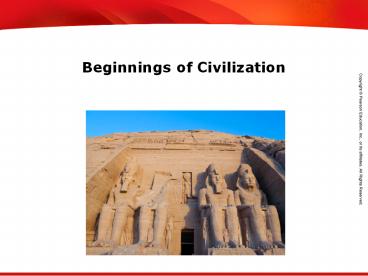Beginnings of Civilization - PowerPoint PPT Presentation
1 / 20
Title: Beginnings of Civilization
1
Beginnings of Civilization
2
Objectives
- Analyze the conditions under which the first
cities and civilizations arose. - Outline the basic features that define
civilization. - Understand the ways in which civilizations have
changed over time.
3
Terms and People
- surplus an amount more than is necessary
- traditional economy an economy that relies on
habit, custom, or ritual and tends not to change
over time - civilization a complex, highly organized social
order - steppe sparse, dry grassland
- polytheistic based on a belief in many gods
4
Terms and People (continued)
- artisan a skilled craftsperson
- pictograph a simple drawing that looks like the
object it represents first step toward writing - scribe a person specially trained to read and
write - cultural diffusion the spread of ideas,
customs, and technologies from one people to
another - city-state political unit that included a city
and the surrounding lands and villages - empire a group of states or territories
controlled by one ruler
5
How did the worlds first civilizations arise and
develop?
The establishment of farming villages was a huge
step in human development. Societies were
becoming more organized and technological
innovation was becoming increasingly complex. A
major change in human existencethe development
of civilizationsoon followed.
6
- River valleys favored farming. Floodwaters
brought silt that kept the soil fertile. - Rivers provided water for drinking and
transportation. - Animals that came to drink provided food.
The earliest civilizations arose near major
rivers.
7
Favorable conditions enabled farmers to produce
surpluses, more food than was necessary.
- Surpluses could be stored for future use.
- These surpluses supported a larger population.
- Villages grew into the first cities.
Away from cities, many people continued to live
as hunter-gatherers. On sparse, dry steppes,
nomadic herders raised cattle, sheep, goats, or
other animals.
8
In these cities, some people were able to work at
jobs other than farming.
- This job specialization was a radical departure
from the traditional economies of the Stone Age. - A traditional economy relies on habit, custom, or
ritual and tends not to change over time.
The rise of cities is the main feature of the
civilizations that arose in river valleys.
9
The worlds first civilizations arose in Africa
and Asia, along the Nile, Tigris and Euphrates,
Indus, and Huang Rivers.
10
- The Olmec and Maya of Mexico and Central America
filled in swamps. - The Incas emerged in the highlands of Peru,
where they farmed on mountainsides.
The first civilizations in the Americas did not
arise in river valleys.
11
In addition to cities, historians identify seven
basic features of early civilizations.
12
Centralized government oversaw large projects to
meet the needs of the community. They
- coordinated food production and storage.
- maintained flood control and irrigation projects.
- organized departments, made laws, collected
taxes, and defended the city.
Priests or warrior kings often claimed their
right to rule from the gods and passed power to
their sons.
13
Most ancient people were polytheisticthey
believed in many gods.
- They appealed to the deities believed to control
the forces of nature. - They sought to gain favor with complex rituals.
- They built temples and made sacrifices.
- Ceremonies required full-time, trained priests.
14
Workers began to specialize in single tasks.
- Artisans such as woodcarvers, weavers, potters,
and bricklayers produced goods needed by the
community. - Metalwork became particularly important. Weapons
and tools were made first from copper and later
from more durable bronze. - Other people with specialized jobs included
merchants, soldiers, storytellers, or musicians.
15
Social organization became more complex. People
were ranked according to their job.
- Priests and nobles had top ranks.
- Next came a small class of wealthy merchants and
artisans. - The vast majority were peasant farmers from
surrounding villages. - Slaves often made up the lowest social level.
16
Skills in these areas expressed the talents,
beliefs, and values of their creators.
- Large palaces and temples were reminders of a
rulers power. - They were often decorated with paintings or
statues of rulers, gods, or goddesses.
Ancient Egyptian temple
17
Governments planned, built, and maintained
large-scale projects to benefit the community.
- Dams controlled river flooding.
- Bridges and roads made travel easier.
- Defensive walls protected against attack.
- Granaries stored food.
- Irrigation canals watered farmland.
18
Most civilizations developed some form of
writing.
- Writing began as pictographs, drawings that
resemble the object represented. - As complex writing systems developed, scribes
were trained to read and write. - Scribes supported the government and economy by
keeping important records, such as harvests and
taxes.
19
Several factors caused civilizations to change
over time.
Societies depended on resources such as stone,
metals, or lumber. Earthquakes, volcanoes,
droughts, loss of soil fertility, or other
changes could devastate a society.
Environmental Changes
Ideas, customs, and technology spread between
cultures. Migration, trade, and wars can be
sources of cultural diffusion.
20
Several factors caused civilizations to change
over time.
As rulers conquered territory, they incorporated
neighboring lands. Conquered people were forced
to provide part of their harvest to the rulers.
Cities grew into city-states.
An empire was a group of states and territories
conquered by one ruler. Defeat could be painful
but often ended wars.

